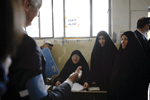Greater efforts needed to improve women’s rights in Iraq
Published on Thu, 2012-07-19 10:12
As the Security Council is discussing the renewal of the mandate of the United Nations Assistance Mission for Iraq this month, concerns remain regarding political consolidation and reconciliation efforts. Women’s rights remain at risk, and their voices are still not adequately heard in the political realm. The issue was debated in the panel discussion held in New York on 9 July 2012 by Hana Edwar, Founder and Secretary-General, Iraqi Al-Amal Association and Ms. Raz Rasool, Founder, Kurdistan Business Women Association. Both Edwar and Rasool discussed on women’s rights in Iraq’s future and gave recommendations on how the Security Council and United Nations Assistance Mission for Iraq (UNAMI) could better support women. While the security situation continues to be fragile, Iraqi women have made much progress towards asserting their political rights, for example securing a quota of 25 per cent of Parliament seats. However, only one woman runs a Ministry and women’s representation does not come with much real power. The panel on “Ensuring implementation of Resolution 1325 on Women, Peace and Security in Security Council’s country-specific work” held at the Permanent Mission of Finland to the United Nations consisted of Edwar, Rasool, and Ambassador Jarmo Viinanen, Permanent Representative of the European country to the UN. According to Rasool the political system and appointments to civil service remain highly dependent on individual connections rather than merit. Recent research into women parliamentarian’s effectiveness revealed many limitations to their ability to instigate change in the traditionally male-dominated structures. Therefore, both Edwar and Rasool hoped that the international community would support women candidates as well as political parties in the forthcoming elections of 2013 and 2014. Women candidates need to be well prepared for their task and political parties need to reform their thinking on support and advice networks. Women’s participation in the ongoing peacebuilding processes is also crucial. Edwar cited several successful civil society initiatives aimed at building trust between communities and across sectarian divisions. However, when tensions rise, women are still very often left out of the negotiation processes and seen as marginal. The linkages and communication between the government and civil society have improved, but much remains still to be done. Edwar and Rasool also recommended that the mandate of UNAMI would explicitly encourage more communication by the UN Mission with the local civil society.
Investing in youth is important UNAMI should also be mandated to support the governments’ efforts in protecting women’s rights and boosting women’s economic opportunities. Women organizations have tried to fight against violence against women, but it is difficult to change old habits and attitudes. Rasool emphasized the need to concentrate on younger generation and educate them to realize their rights and possibilities. As changing the mentality of the society is going to take a generation, it is important to invest in the youth of today. Women’s organizations have also engaged in working for example with the Ministry of Interior and the High Judicial Council and some promising advances have been made. Rasool referred to recent legislative reforms and setting up of publicly run shelters in the Kurdistan region, which could serve as a good practice to be replicated in the rest of the country. Finally, Rasool and Edwar called on more support to be given to increase economic opportunities for women. At the tenth Anniversary of Resolution 1325 in October 2010, the NGO Working Group on Women, Peace and Security reported that the Security Council has all the norms and tools at hand to make women’s rights and women’s participation in conflict and post-conflict situations a reality. Yet when it came to country-specific work of the Council, the implementation of the women, peace and security agenda was much more uneven. The Permanent Mission of Finland to the UN has teamed up with the NGO Working Group on Women, Peace and Security to try change that and help the Security Council ensure that women’s voices are genuinely heard when critical discussions take place and important decisions are made. The NGO Working Group on Women, Peace and Security serves as a bridge between women’s human rights defenders in conflict-affected situations and policy-makers at UN Headquarters. The NGO Working Group composed of 18 international non-governmental organizations advocates for the full implementation of Security Council resolutions on Women, Peace and Security and plays an important global role in monitoring policy and practice. Source |


